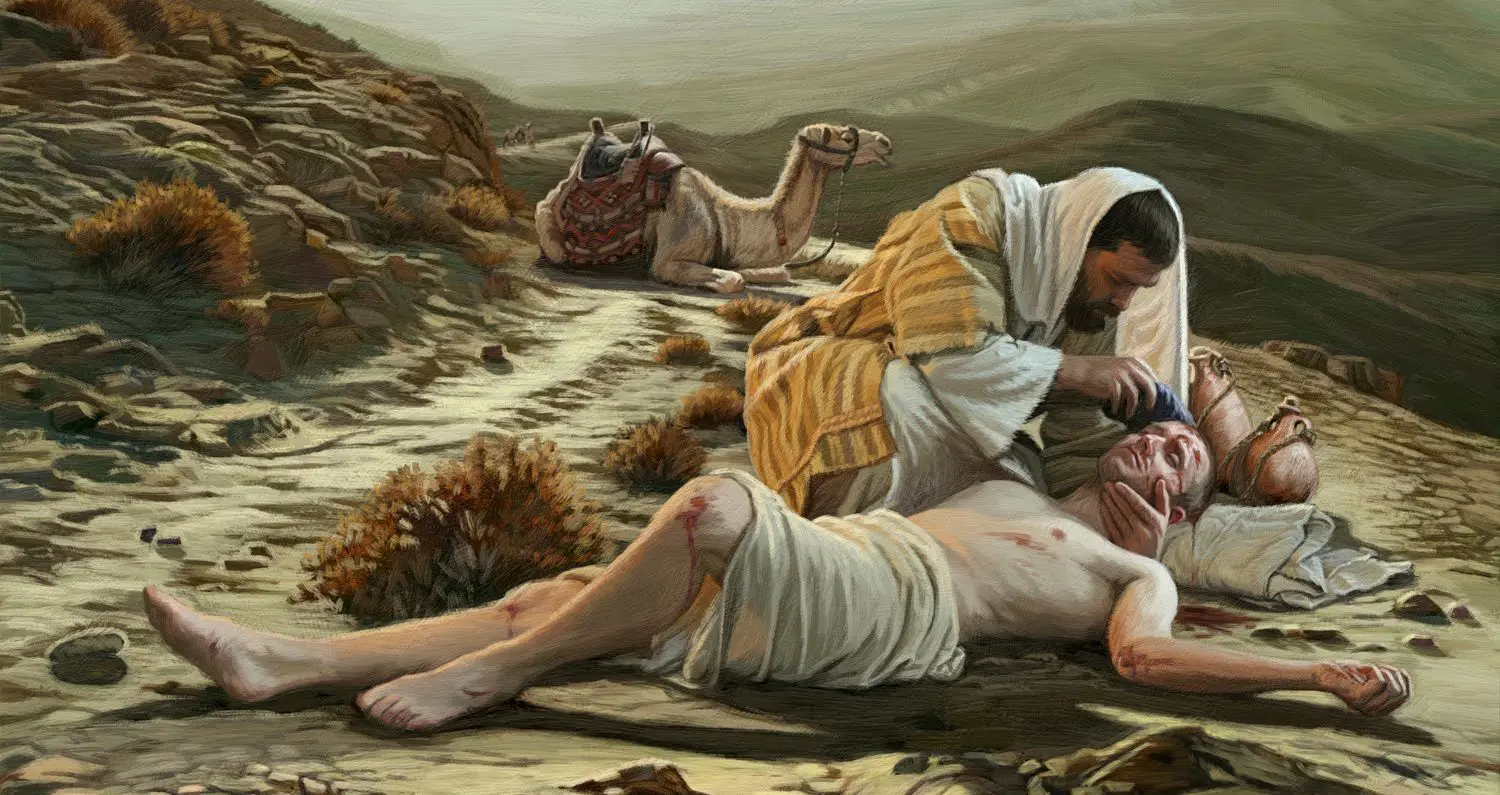
“The day when we decide that the Government is our brother’s keeper, that is the day the spirit of compassion has been lost.” —Herbert Hoover, 1949
If you are not reading the Libertarian Christian Institute’s blog series, “Compassion, Not Compulsion,” you should be. It has demonstrated why the distinctly Christian understanding of charity is incompatible with government poverty relief efforts. It isn’t that God wants to protect the wealth of the rich from redistribution. Nor does the Bible advocate a rugged individualist, “pick yourself up by the bootstraps” ideology.
Rather, true, Christlike, compassionate charity is characterized by three things:
The welfare state views material need — and, increasingly, material inequality — of paramount importance. Moreover, heartfelt voluntarism is negated by the compulsion of taxation, holistic care is beyond its limited capabilities, and sympathy is not exactly what welfare offices are known for.But when we look at the way Jesus rendered aid, we find that his first priority was spiritual. Material aid, including Jesus’ own miraculous form of healthcare, was always rendered in service of Christ’s spiritual mission. Jesus fed the crowd so that they would stay to hear his message. He forgave people of their sins in order to restore their relationship with God. He healed the blind, lame, crippled, and diseased as a symbol of the holistic abundance of life he came to bring.
Christ’s mission on Earth was nothing less than to redeem all of creation, which includes the crucial spiritual angle of forgiveness of sins and restoration of right relationship with God, but also includes the redemption of physical brokenness and need.
The substance of the Kingdom of God, which Jesus inaugurated during his time on Earth, is spiritual, material, and communal wholeness of life. This, I believe, is the meaning of the “abundant life” mentioned in John 10:10.Now, here’s the kicker: We — the church, the body of Christ on Earth — have been designated by God to be the primary channel through which the material and communal blessings of the Kingdom of God are distributed. Search the Scriptures, and you will find evidence of this truth everywhere.
This explains why many societies throughout history that were primarily characterized by Christian thought envisioned little to no proper role for the government in the relief of material needs. In the Christian worldview, separating the material from the spiritual and communal — as the welfare state does — makes no sense.One example of this comes from an essay written by ex-president Herbert Hoover for the magazine Faith And Freedom in 1949 titled “Should Government Be our Brother’s Keeper?” An abridged version of the essay can be found in this 1960 edition of Faith And Freedom magazine. Hoover outlines six reasons why government should not replace voluntary organizations, including and especially the church, in the provision of material aid to the needy:
Compassion, says Hoover, is the “noblest expression of man” that gives “untold spiritual benefit” not only to the receiver of the aid but also to the giver. It unites the rich and the poor into a blessed, mutually edifying communion. It provides an avenue through which the giver can seek God’s Kingdom, and it provides the poor an avenue through which to partake in the abundance of the Kingdom.
But when the government steps in to render material aid to the poor through its impersonal, bureaucratic programs, all sympathy, heartfelt voluntarism, and holistic care is abandoned. “The day when we decide that the Government is our brother’s keeper,” says Hoover, “that is the day the spirit of compassion has been lost.”
Sure enough, as documented by Robert Putnam in Bowling Alone in 2000, Charles Murray in Coming Apart in 2013, and Nathan Dietz and Robert Grimm in a 2019 paper titled “A Less Charitable Nation,” both volunteering and charitable giving have been declining on a per-capita basis since the mid-1960s. Up to the mid-1960s, however, volunteering and charitable giving had been on the rise. What changed during that decade? A massive expansion of government welfare programs through the “War on Poverty.” I would add that, over roughly the same time period, self-identification as “Christian” has likewise waned.
Rewinding further back to the Great Depression, as I wrote in my book The Third Temptation, ample evidence suggests that New Deal programs crowded out private and church charitable activities. What’s more, it also spurred the long-term decline of mutual aid (or “fraternal”) societies, to which roughly a third of American households had once been members.
This knowledge imbues President Hoover’s radio address to the nation in 1931, during the depths of the Great Depression, with an extra sense of urgency. In this address, Hoover articulated a distinctly Christian view of charity:
Our country and the world are today involved in more than a financial crisis. We are faced with the primary question of human relations, which reaches to the very depths of organized society and to the very depths of human conscience. This civilization and this great complex, which we call American life, is builded and can alone survive upon the translation into individual action of that fundamental philosophy announced by the Savior 19 centuries ago. Part of our national suffering today is from failure to observe these primary yet inexorable laws of human relationship. Modern society cannot survive with the defense of Cain, “Am I my brother’s keeper ?”
No governmental action, no economic doctrine, no economic plan or project can replace that God-imposed responsibility of the individual man and woman to their neighbors. That is a vital part of the very soul of a people. If we shall gain in this spirit from this painful time, we shall have created a greater and more glorious America. The trial of it is here now. It is a trial of the heart and the conscience, of individual men and women.
In a little over a month we shall celebrate our time-honored festival of Thanksgiving. I appeal to the American people to make November 26 next the outstanding Thanksgiving Day in the history of the United States; that we may say on that day that America has again demonstrated her ideals; that we have each of us contributed our full part; that we in each of our communities have given full assurance against hunger and cold amongst our people; that upon this Thanksgiving Day we have removed the fear of the forthcoming winter from the hearts of all who are suffering and in distress–that we are our brother’s keeper.
Compassionate charity is imbued with spiritual, emotional, and social meaning. Government welfare is devoid of such meaning. Ninety years ago, Herbert Hoover understood this and passionately articulated a beautiful, distinctly Christian vision of a compassionate society.Sadly, most Americans didn’t recognize the consequences of abandoning this vision, and today, we are suffering for it. The social fabric of the nation has never been more frayed. Volunteer hours and charitable giving per capita are declining. Church attendance and self-identification as Christian continue to wane. It is not all due to the rise of the welfare state, but the welfare state has played a significant role in our country’s ills.Why? Because God designed human beings to sympathetically, voluntarily, wholeheartedly, and holistically be our brother’s keeper. When we outsource that job to the government, or allow government to take it from us, then no one is their brother’s keeper. We Christians should proclaim this boldly and lead the charge to take back our God-given role in distributing the abundance of the Kingdom. If we don’t, or if we fail, the spirit of compassion of our nation will truly be lost.

Articles posted on LCI represent a broad range of views from authors who identify as both Christian and libertarian. Of course, not everyone will agree with every article, and not every article represents an official position from LCI. Please direct any inquiries regarding the specifics of the article to the author.
Did you read this in a non-English version? We would be grateful for your feedback on our auto-translation software.
), //libertarianchristians.com/wp-content/plugins/smartquizbuilder/includes/images/template6-latest.jpeg))

), https://libertarianchristians.com/wp-content/plugins/smartquizbuilder/includes/images/template6-latest.jpeg))








































), https://libertarianchristians.com/wp-content/plugins/smartquizbuilder/includes/images/template6-latest.jpeg))
), https://libertarianchristians.com/wp-content/plugins/smartquizbuilder/includes/images/template6-latest.jpeg))
), https://libertarianchristians.com/wp-content/plugins/smartquizbuilder/includes/images/template6-latest.jpeg))





*by signing up, you also agree to get weekly updates to our newsletter
Sign up and receive updates any day we publish a new article or podcast episode!